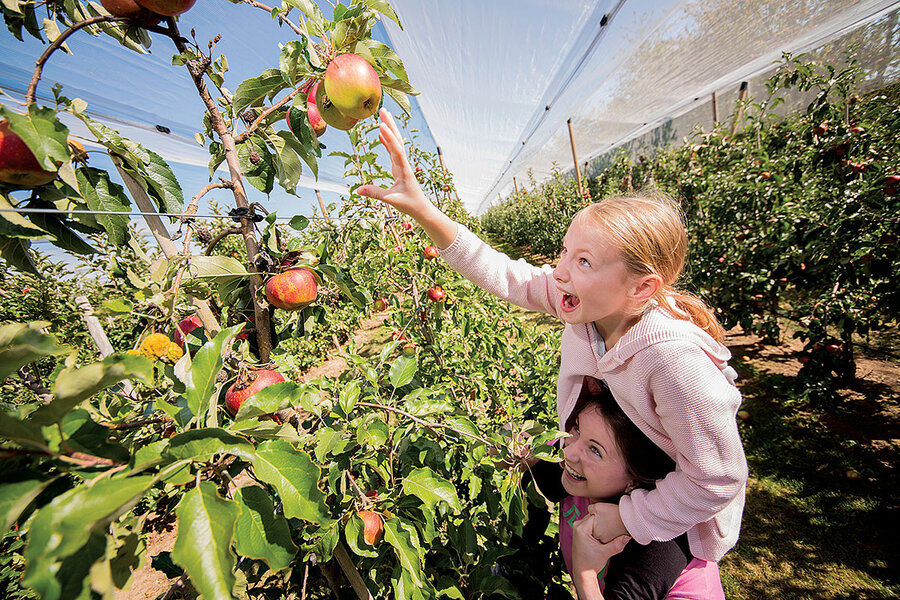An autumn harvest of joy – and apples
Loading...
Apple trees can live to tremendous ages. Their hardiness crescendos with the advent of the apple harvest.
The joy of apple picking is contagious. I invited Sebastian, a little boy I mentor in the Big Brothers program, to come along on the adventure. Skeptical that something unrelated to the computer could be fun, he nevertheless joined me. On the ride to the orchard I taught the lad to pronounce Spitzenberg, Nonpareil, and Hubbardston Nonesuch – three types of apples.
Why We Wrote This
Do not despair of the computer generation’s zeal for nature, our essayist argues. Given an introduction and some coaching, they may run you ragged.
A child learns fast. Within minutes, Sebastian was a resident species. He ran down the long rows of trees, calling out to me, “Macouns! I found the Macouns!”
As I watched Sebastian scurry among the trees, it struck me that the tables had turned: He was the teacher, and I the child being taught by example that apple picking is, at root, joyous.
We filled our canvas totes, but for Sebastian it wasn’t enough. “But there are still so many apples left,” he lamented, as if it were our duty to pick them all. I spoke quietly to him about the idea of sharing and sufficiency. He relented when I promised that there would be future apple harvests.
I didn’t dare tell him that I was simply tired.
Apple trees are not generally graceful things. There’s a kind of determined gnarliness about them, a tendency to go every which way in the joints. Like children, they can be wayward, as if saying, “You can tend me, but don’t try to bend me.” They can live to tremendous ages, and they are able to withstand all manner of insults, from brutal Maine winters to searingly hot summers to lightning strikes. Through it all they go on bearing, defiantly, as if every affront were a fresh invigoration.
This virtue of hardiness crescendos with the advent of the apple harvest. All along the roadways the signs go up: “Pick your own!”
I never have to be told twice.
Why We Wrote This
Do not despair of the computer generation’s zeal for nature, our essayist argues. Given an introduction and some coaching, they may run you ragged.
I have found that apple orchardists are some of the most dedicated and impassioned folks around. If they were singers or poets, their verses would be full of the most wonderful syllables: Esopus Spitzenburg, Orange Pippin, Summer Rambo, Westfield Seek-No-Further, Old Nonpareil, Northern Spy, Sops of Wine ...
It is the allure of these names that draws me to local orchards, where I am often greeted like a prodigal, too long gone from apple picking. Now, having mended my ways, I’ve returned with my canvas tote bags.
I am convinced that the joy of apple picking is contagious. To this end, during the recent apple season, I invited Sebastian, a little boy I mentor in the Big Brothers program, to come along on the adventure. Skeptical at first that something unrelated to the computer could be fun, he nevertheless joined me. On the ride to the orchard I talked up the apples big time, teaching the lad to pronounce Spitzenberg, Nonpareil, and Hubbardston Nonesuch. Then I challenged him to say them backward. By the time we arrived at the orchard, he was primed and eager.
A child, having empty pockets and a mind uncluttered with responsibilities, learns fast. Within minutes of our arrival Sebastian had adapted to the environment of the orchard, as if he were a resident species in his own right. I could barely keep up as he ran down the long rows of trees, calling out to me, “Macouns! I found the Macouns!”
Apple picking is rewarding. It’s fun. It’s also an education. And, needless to say, it’s work. From the tart, smallish Pink Lady to the sweet, grapefruit-sized Wolf River, an orchard offers variety in size, heft, and, of course, taste. As I watched little Sebastian scurry among the trees, straining to reach the biggest apple, or the reddest, or simply what he judged to be the prettiest, it struck me that the tables had been turned: He was the teacher, and I the child being taught by example that apple picking is, at root, a joyous enterprise.
We filled our totes to overflowing, but for Sebastian it wasn’t enough. Turning back toward the trees, he lamented, “But there are still so many apples left,” as if it were our duty to pick them all. I spoke quietly to him about the idea of sharing and sufficiency. He nodded, but I could still feel the longing in his heart for just one more McIntosh or Honeycrisp.
He seemed to relent only when I promised, insofar as it was mine to promise, that there would be future apple harvests. (I didn’t dare tell him that I was simply tired.)
As we drove home, the car filled with the achingly sweet aroma of fresh, fresh apples, my last thoughts before dropping Sebastian off with his gleanings were the words of Robert Frost, who seems to have been witness to our experience (in “After Apple-Picking”):
And there’s a barrel that I didn’t fill
... and there may be two or three
Apples I didn’t pick upon some bough.
But I am done with apple-picking now.
Essence of winter sleep is on the night,
The scent of apples: I am drowsing off.







